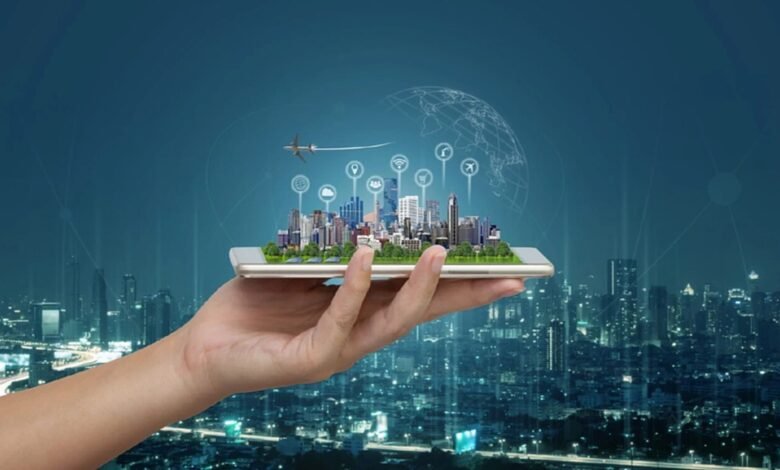The Economics of Smart Cities: Investing in a Sustainable Urban Future

Investing in a Sustainable Urban Future through Smart Cities is not just a visionary concept but a pressing necessity in today’s rapidly urbanizing world. As cities continue to expand, so do the challenges of congestion, pollution, and resource depletion. In response, the emergence of Smart Cities offers a beacon of hope, presenting innovative solutions that integrate technology and sustainable practices to address these urban complexities effectively.
Smart Cities represent a paradigm shift in urban development, leveraging cutting-edge technologies to optimize resource utilization, enhance efficiency, and improve the overall quality of life for residents. By embracing smart infrastructure and data-driven solutions, cities can not only mitigate the negative impacts of urbanization but also pave the way towards a more resilient, equitable, and environmentally sustainable future.
The Economics of Smart Cities
The Growth of Urbanization
With more than half of the world’s population now residing in cities, urbanization has become a defining trend of the 21st century. While cities offer opportunities for economic growth and innovation, they also present significant challenges such as congestion, pollution, and resource depletion. Smart Cities aim to tackle these challenges by leveraging technology and data-driven solutions.
Understanding the Economics of Smart Cities
At its core, the economics of Smart Cities revolve around finding cost-effective solutions to improve the quality of life for urban residents while promoting sustainability and efficiency. By investing in smart infrastructure and innovative technologies, cities can optimize resource utilization and enhance overall productivity.
Infrastructure and Technology Integration
The development of Smart Cities requires a seamless integration of various components, including smart transportation systems, energy-efficient buildings, and digital connectivity. These infrastructure investments serve as the foundation for building resilient and sustainable urban environments.
Economic Benefits of Smart Cities
One of the primary benefits of Smart Cities is the potential for significant cost savings through improved efficiency and resource management. By adopting smart technologies such as IoT sensors and data analytics, cities can optimize energy usage, reduce waste, and lower operational costs.
Investment Opportunities in Smart Cities
Investing in Smart Cities presents lucrative opportunities for both public and private sector entities. Public-private partnerships (PPPs) have emerged as a popular financing model for smart infrastructure projects, allowing for the sharing of risks and resources between government agencies and private investors.
Environmental Sustainability
Smart Cities prioritize environmental sustainability by implementing green initiatives such as renewable energy sources, waste recycling programs, and green building standards. By reducing carbon emissions and mitigating environmental risks, cities can create healthier and more livable communities.
Social Equity and Inclusion
Ensuring equitable access to smart technologies and services is essential for promoting social inclusion and reducing disparities within urban populations. Smart City initiatives must be designed with a focus on accessibility and affordability to ensure that all residents can benefit from technological advancements.
Policy and Governance
Effective policy and governance frameworks are critical for the successful implementation of Smart City projects. Governments need to establish clear regulations and standards to guide urban development and ensure transparency, accountability, and citizen participation.
Case Studies
Several cities around the world have already embraced the Smart City concept and are reaping the benefits of their investments. Examples include Singapore’s smart transportation system, Barcelona’s smart grid infrastructure, and Amsterdam’s sustainable urban planning initiatives.
Future Outlook
As technology continues to evolve and urbanization accelerates, the demand for Smart City solutions is expected to grow exponentially. Future trends in Cities may include the widespread adoption of autonomous vehicles, the development of smart grid networks, and the integration of AI-driven urban management systems.
Read More: Remote Work Revolution: Tips for Setting Up Your IoT Home Office
Conclusion
The economics of Smart Cities represent a paradigm shift in urban development, offering a path towards sustainable growth and prosperity. By investing in smart infrastructure, embracing innovation, and prioritizing environmental and social objectives, cities can create a better future for generations to come.
FAQs
1. How do Smart Cities benefit the economy?
Smart Cities promote economic growth by improving efficiency, reducing operational costs, and attracting investments in innovative technologies and infrastructure.
2. Are Smart City initiatives affordable for developing countries?
While implementing Smart City projects may require significant upfront investments, the long-term benefits, such as cost savings and improved quality of life, outweigh the initial costs. Moreover, international funding and assistance programs are available to support developing countries in their Smart City endeavors.
3. What role do citizens play in Smart City development?
Citizen engagement is essential for the success of Smart City initiatives. By actively involving residents in decision-making processes and soliciting feedback, cities can ensure that their projects meet the needs and preferences of the local community.
4. How do Smart Cities address cybersecurity concerns?
Smart Cities implement robust cybersecurity measures to safeguard data privacy and protect against cyber threats. This includes encryption protocols, network security measures, and regular audits to identify and mitigate vulnerabilities.
5. What are the environmental benefits of Smart Cities?
Smart Cities promote environmental sustainability by reducing carbon emissions, conserving natural resources, and implementing green infrastructure projects such as urban parks and green spaces.











